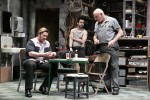It is difficult to imagine that violence, conspiracy and the potential loss of a dear friendship are consequences of the pursuit of … a nickel. However, the play “American Buffalo” proves that a coin can be responsible for all that and then some.
Performed at the Geffen Playhouse, Pulitzer Prize-winning writer David Mamet’s “American Buffalo” focuses solely on three men named Don (Bill Smitrovich), Teach (Ron Eldard) and Bob (Freddy Rodriguez) who are on the hunt for a valuable Buffalo Head nickel. Through each character’s attempt to execute a coin heist, the actors portray a certain intensity and drama while simultaneously delivering light-hearted humor to the stage.
The story takes place entirely in one area – a junk shop with intricate detail and authentic rust and clutter that replicates a ’70s junk shop.
It is almost immediately understood that Don is the responsible, parental figure in the play, as he is introduced mentoring the much younger and less intelligent Bob. It is upon discovering the knowledge that a valuable coin was sold to a man for less than its worth that the two men plan a coin heist.
However, the dynamics of their camaraderie are changed when the loud and occasionally belligerent Teach enters the junk shop. Teach, a friend of Don’s, attempts to convince Don to execute the robbery together without Bob because Teach believes Bob lacks the necessary skill and experience. This ultimately leaves Don unsure of what to do, reluctant to potentially harm his genuine friendship with Bob.
The sentiment of “American Buffalo” essentially emanates from the relationship between Bob and Don, more so than in other renditions of the play. While it is easy to get wrapped up in the drama and plot of the story like many versions have, this rendition highlights more of the humanistic aspects of the play, as the relationships are ultimately regarded above all else.
As a man with a good physical build, Don often finds himself in the position of both power and mediation between the other two men. Smitrovich delivers his lines with earnestness and conviction that allows audiences to truly believe his character means well for the trio despite the immorality of a coin heist. In doing so, Smitrovich seems to contribute what the character of Bob lacks, which is the ability to add a third dimension to a rather two-dimensional character.
Executed quite conventionally, Bob’s character as a lesser man (because of his inability to think critically or quickly) creates predictability in the play. With the occasional scratch of the head and unauthentic lower register of the voice, Rodriguez’s portrayal of a dim-witted character appears to bring nothing extraordinary to the stage.
Nevertheless, the chemistry between Rodriguez and Smitrovich help audiences believe in the passion behind Bob and Don’s relationship, for what one disregards, the other discerns. Although generic in his portrayal of a less intelligent character, Rodriguez presents an honest willingness in Bob to satisfy Don, reminiscent of father-son relationships.
These characteristics are what essentially make Don think twice before conspiring with Teach.
Opposite Bob, Teach presents himself as a man of great knowledge and experience but simply has excessive cockiness and vulgarity. With dialogue dirtier than bathwater, Eldard’s high-volume expressions of profane words at times becomes overdone and unentertaining. As a whole though, in often serving as the comic relief, Eldard adds a certain liveliness and animation that maintains audiences’ interest.
It’s in the concluding actions of Teach’s violent outburst that the characters resolve their issues, ultimately allowing the overarching theme of friendship versus business and money to shine through. Through these themes, it becomes understood that a coin that started it all has the ability to also end it all.
